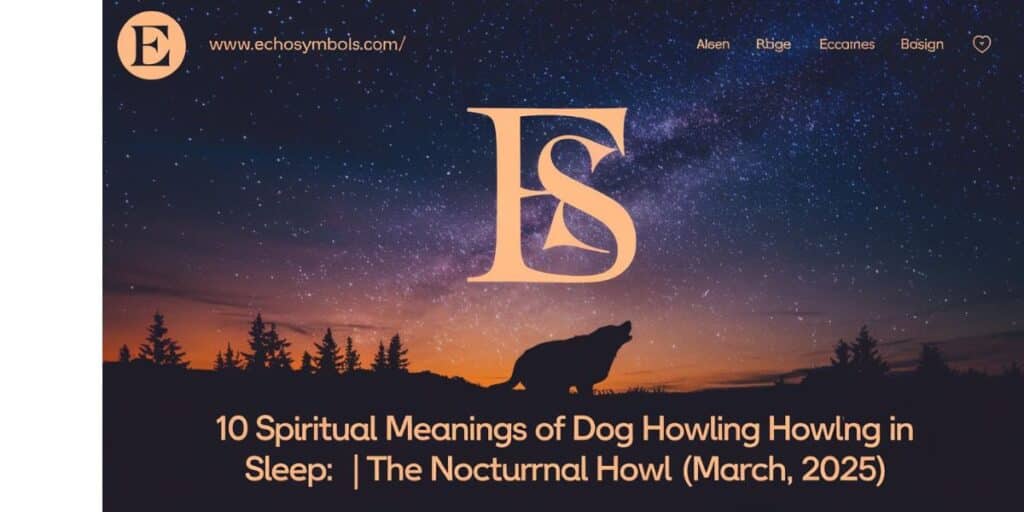10 Spiritual Meanings of Dog Howling in Sleep: The Nocturnal Howl is a fascinating exploration into the spiritual meaning of dog howling during sleep. Many dog owners often wonder about this behavior, thinking it might just be a random action.
However, there’s more to it than meets the eye. In this article, we’ll uncover the deeper emotional release and primal instincts that influence a dog’s nocturnal vocalizations.
Understanding the spiritual connection behind these sounds can help owners gain insight into their dog’s subconscious world and their unique ways of communicating with the universe.
The Spiritual Significance of Dog Howling in Sleep In a Nutshell
10 Spiritual Meanings of Dog Howling in Sleep: The Nocturnal Howl
Dogs have long been viewed as beings with a deep spiritual connection to the unseen world. From ancient civilizations to modern times, their intuitive sensitivity and mystical bond with the universe have captured the imagination of many. One of the most intriguing behaviors that highlight this connection is the act of howling in sleep. While it may seem like an ordinary response to dreams or external stimuli, the spiritual meaning behind a dog’s howl during slumber is often linked to something much deeper. Here are ten spiritual interpretations of why dogs howl in their sleep
Must read about: 15 Spiritual Meanings of Ladybug With No Spots Explained
1. Communication with the Spiritual Realm
One of the most widely believed spiritual reasons for a dog howling in its sleep is that they are communicating with spirits or otherworldly beings. Dogs are often thought to be sensitive to energies and forces that humans cannot perceive. The howl could be a form of spiritual dialogue, signaling their awareness of unseen entities or energies in their environment.
2. Connecting with Ancestral Spirits
In many cultures, dogs are seen as spiritual guides or guardians of the soul. Some believe that when a dog howls in their sleep, they may be connecting with their ancestral spirits or receiving guidance from those who came before them. The howl could be a message or a sign that the dog is in touch with these ancestral forces.
3. Alignment with Energetic Frequencies
Dogs are incredibly attuned to energy shifts, and their howling could be a response to the energetic frequencies around them. In a more spiritual sense, it may represent the dog’s way of aligning itself with the energies of the universe. This could also be a manifestation of their subconscious journey to find balance or harmony with these forces.
4. Primal Instincts Rising to the Surface
Dogs, particularly when they enter REM sleep, may tap into their primal instincts, such as the need to communicate or call out to their pack. The howl could be an unconscious expression of these instincts, allowing the dog to reconnect with their wild, ancestral nature, even if they no longer live in the wild.
5. Heightened Sensitivity to Spiritual Growth
Another theory suggests that dogs howl as a response to their own spiritual growth. Just like humans, animals can experience moments of spiritual awakening or personal transformation. Howling could be a manifestation of this growth, as they tap into higher realms of consciousness or unlock new layers of understanding.
6. Protective Energy
Dogs are often seen as protectors, and their howling might signify that they are guarding their human family from unseen spiritual forces. The howl could be a signal that the dog is on alert, protecting both their loved ones and themselves from negative or unfamiliar energies.
7. Response to Unseen Spiritual Entities
Many people believe that dogs can sense spirits or other unseen beings. If a dog howls in their sleep, it might be a reaction to the presence of an entity or spirit that is nearby. In this sense, the howl is their way of acknowledging or responding to these unseen visitors.
8. Signaling to the Universe
In a more esoteric interpretation, howling in sleep can be seen as a spiritual call to the universe. The dog may be reaching out in an attempt to communicate with the cosmos, either asking for guidance, offering a prayer, or simply connecting with the vast energies around them. This makes their howl a form of spiritual expression beyond mere vocalization.
9. Manifestation of Unresolved Energies
Much like humans, dogs carry emotional and spiritual baggage, and their howling could be a way to release or process unresolved energies. These could be emotions from the day, ancestral memories, or spiritual lessons that the dog is working through during their sleep. The howl serves as a release mechanism to help them cope with these energies.
10. A Bridge Between the Physical and Spiritual Realms
Dogs have long been thought of as beings that can bridge the gap between the physical and spiritual worlds. Howling during sleep could be their way of transcending the boundaries of the material world and reaching out to the spiritual realm. Their howl may be a spiritual bridge, connecting their consciousness with realms beyond our understanding.
Emotional Release: The Cathartic Power of Dog Howling in Sleep
Howling as Emotional Expression
Just like humans, dogs experience a wide range of emotions throughout the day, from joy and excitement to anxiety and frustration. However, dogs may not always have the opportunity to fully express these emotions while they are awake.
This emotional buildup can carry over into their sleep, where they process and release pent-up feelings. Howling in sleep can thus be seen as a cathartic expression, allowing dogs to unload accumulated emotional weight.
Visit this: The Spiritual Significance of Daddy Long Legs: The Spider’s Web of Life
Emotions Carried into Sleep
Throughout the day, dogs may encounter stressful or exciting situations that stir up emotional responses. For example, they may become excited when meeting new people or animals, feel nervous during thunderstorms, or experience anxiety when left alone.
These emotions, if not expressed or resolved during waking hours, can cause internal tension. When dogs enter REM sleep, their minds and bodies process these emotions, and howling serves as a natural way to release the emotional tension.
The Cathartic Power of Howling
The act of howling in sleep serves as an important emotional release for dogs, much like a human might cry or shout in frustration. For dogs, howling is a safe outlet that allows them to navigate the complex emotions they may have accumulated, whether from daily events or deeper emotional struggles.
When Howling Becomes a Concern
While occasional howling is normal and healthy, frequent or intense howling may indicate that a dog is struggling with stress or unresolved anxiety. If your dog consistently howls during sleep, it could be a sign that they are facing emotional discomfort, such as separation anxiety or past trauma.
Identifying potential stressors in their environment and providing a calming space can help them feel more secure and balanced, allowing them to process emotions in a healthier way. Understanding the emotional release behind your dog’s howling can strengthen your bond and ensure their emotional well-being.
Spiritual Connection: The Divine Call of the Wild
Dogs as Spiritual Guides
Throughout history, dogs have been revered not only as companions but also as spiritual guides and messengers. In ancient civilizations, including Egyptian and Celtic cultures, dogs were believed to be protectors of the soul and guides to the afterlife. This belief stems from the idea that dogs have a special connection to the divine, making them natural conduits to higher realms or spirits.
Attunement to Spiritual Energies
Dogs are highly sensitive to sound, vibration, and energy, which makes them uniquely attuned to energies that humans may not perceive. This sensitivity allows them to connect with spiritual realms, especially when they are in a vulnerable, open state during sleep.
Howling in sleep could then be understood as a form of communication with spirits or as a way for dogs to tap into the divine energies around them, expressing their connection to something greater than the physical world.
Cultural Beliefs and Spiritual Roles
In many cultures, dogs have been viewed as intermediaries between the physical and spiritual realms. In ancient Greece, dogs were believed to have the ability to see and communicate with spirits, playing a key role in spiritual rituals.
The act of howling could be interpreted as a call to the divine, a way for dogs to communicate with unseen energies and connect to higher spiritual truths, maintaining a bond with their untamed nature.
The Divine Call of the Wild
In the modern world, the connection between dogs and the divine continues to resonate with many pet owners, who feel a sense of peace and comfort in the presence of their dogs. Howling in sleep can serve as a reminder that dogs are not only companions but intuitive beings that maintain a deep spiritual link to the universe.
This howling may not only reflect their dreams but could also be a message from the divine, a prayer for guidance, protection, or insight, further emphasizing the mystical role dogs play in connecting us to deeper spiritual truths.
Ancient Instincts: The Primal Call of the Wild
The Legacy of Primal Instincts
Even though dogs have been domesticated for thousands of years, much of their primal nature remains deeply ingrained in their behavior. Their ancestral instincts, passed down from their wolf ancestors, shape how they interact with the world.
These instincts continue to emerge in various ways, including how dogs behave during sleep. Howling in their sleep can be seen as a direct connection to the primal call of the wild that once signaled important messages to their pack.
Howling as a Connection to Ancient Survival Behaviors
In the wild, wolves howled to communicate with their pack, mark territory, or signal danger. These behaviors were vital for their survival. When dogs howl in their sleep, it’s possible they are subconsciously tapping into these deeply embedded instincts, reaching back to times when howling was essential for survival and connection within the pack. This behavior is not just random; it might reflect a subconscious link to their wild past.
Instincts in Modern Dogs
Despite domestication, dogs still exhibit behaviors that echo their wild roots, such as barking, digging, or chasing. These actions hint at the canine instincts that were once crucial for hunting or territorial protection. The act of howling in sleep could be a physical manifestation of these primal instincts, representing the deep connection dogs have to their ancestors and the wild world they once roamed.
Sensitivity to Unseen Stimuli
The howl during sleep may also be a response to stimuli that humans can’t perceive, such as subtle vibrations, sounds, or even energies. Dogs are highly attuned to their environment, and their heightened sensitivity to these stimuli is part of their ancestral connection to the wild.
This instinctual response remains strong, even in domesticated settings, and howling in sleep can serve as a reminder of the dog’s place in the natural world beyond their home.
Dreamscapes: A Window into the Subconscious
Dogs’ Dream States and REM Sleep
Dogs, like humans, experience dreams during REM sleep, a phase where the brain is highly active and vivid images and sensations come to life. During this time, dogs can have dreams that are filled with a range of experiences—from playful activities to more intense situations. These dreams are often emotional and vivid, influencing their physical reactions, including vocalizations like howling.
Howling as a Response to Dreams
When dogs howl in their sleep, it’s not just a random noise but likely a reflection of the images, feelings, and sensations they are experiencing in their dreams. Just like humans may talk or move during sleep, dogs can react to the scenarios they inhabit, which might include real-life experiences like playing or interacting with other animals. They could also tap into deeper, more subconscious themes, such as dreams of wild ancestors or interactions with past companions.
Emotional Release and Subconscious Processing
The subconscious mind stores unresolved emotions and memories, and for dogs, dreams can serve as an outlet to process these. Howling could be a release of emotions related to the day’s events, like excitement or stress, or it might reflect deeper instinctual memories from their wild ancestors. This emotional release is a natural way for dogs to navigate their inner world and manage feelings they may not fully comprehend.
The Complexity of Dogs’ Inner Lives
Witnessing a dog howling in their sleep can serve as a reminder of the complexity of their emotional and mental worlds. These nocturnal sounds offer insight into how dogs process their memories, instincts, and emotions.
Howling in sleep is more than just a physical reaction; it’s a manifestation of the dreamscapes they experience, helping them navigate unresolved feelings and connecting them to their rich, inner emotional lives.
Communication: The Language of the Heart
Dogs’ Unique Communication Styles
Dogs are incredibly communicative creatures, using a combination of sounds, body language, and behaviors to express themselves. Howling in sleep is one of the many ways dogs communicate their emotional state and their connection to their surroundings. Like humans rely on words and facial expressions, dogs have their own language to convey feelings, whether consciously or unconsciously.
The Language of the Heart
Dogs communicate not only through barking and howling but also through subtle cues like tail wagging, ear positioning, and the way they move. Howling during sleep could be an expression of a deep emotion. Whether it’s excitement, fear, sadness, or longing, the howl can represent a deeper, often subconscious form of communication with their emotional world.
Emotional Sensitivity and Howling
Dogs are highly attuned to the emotional states of their humans, other animals, and their environment. They may howl to express distress, to alert others to a potential danger, or to communicate more subtle feelings during sleep. This sensitivity to emotional shifts can make their howling a way to reach out or process emotions they may not fully understand.
A Primal Communication Link
The instinct to howl in sleep may also connect dogs to their ancient ancestors, such as wolves, who used howling to communicate with their pack and mark their territory. This primal urge for vocalization remains embedded in a dog’s DNA, even though domesticated dogs no longer rely on howling for communication.
Energy Release: Balancing the Energetic Body
Dogs’ Energetic Bodies and Their Health
Like all living beings, dogs possess an energetic body that influences their overall health and well-being. Just as humans focus on balancing the mind, body, and spirit, dogs too experience a flow of energy that impacts their physical and emotional states. This flow of energy is integral to maintaining balance and vitality in their lives.
Howling as an Energy Release
Howling during sleep can be seen as a form of energy release, allowing dogs to maintain balance within their energetic body. If the energy field becomes imbalanced due to stress, trauma, or emotional buildup, it can manifest in behavioral changes, restlessness, or physical discomfort.
Energy Absorption and Discharge
Dogs absorb and emit energy from their surroundings, especially during emotional or physical activity. This heightened energy can be overwhelming if not released properly. This release helps them stay balanced and avoid emotional or physical stagnation.
Sound as a Tool for Healing
In many spiritual and energy healing practices, sound is used to clear blocked energy and restore balance. A dog’s howl, as a form of vocalization, can function similarly by helping them realign their energetic body. Just as humans use chanting or meditation for emotional regulation, a dog’s howl serves as a self-care practice that facilitates emotional release and restores their overall well-being.
Protection: The Warning Call
Dogs’ Inherited Protective Instinct
Dogs have a deeply ingrained protective instinct, a trait they share with their wild ancestors, like wolves. Throughout history, dogs have been valued as guardians, offering companionship and protection to humans. This instinct to protect is not just a characteristic of domesticated dogs but a continuation of behaviors passed down from their wild relatives, who would howl to warn their pack of danger or intruders.
Howling as a Warning Call
Dogs retain this instinct, and their howling in sleep can sometimes act as a warning call. This behavior may occur when a dog’s subconscious senses a threat or shift in energy, whether it’s an unfamiliar sound, a change in the environment, or even emotional shifts within the household.
Heightened Sensitivity and Howling
Dogs possess heightened senses, especially when it comes to hearing, smell, and intuition. These abilities allow them to detect dangers or disturbances that might be imperceptible to humans. The howl could be a subconscious response to alert their pack, whether it’s to an emotional disturbance or a more tangible physical threat. This instinctual alertness continues in their domesticated lives, even during sleep.
Howling as Spiritual and Emotional Protection
Beyond physical threats, a dog’s howling can also reflect their deeper connection to their role as protectors on a spiritual or energetic level. Just as wild dogs or wolves would communicate through howls to signal a sense of alertness, domestic dogs may howl when they sense emotional tension, energetic disturbances, or shifts in the emotional atmosphere of the household.
Guidance: Seeking Answers in the Dark
Dogs as Intuitive Animals
Dogs are often regarded as intuitive beings with a profound connection to the unseen world. Many believe that their extraordinary ability to sense energies and disturbances allows them to perceive things that humans cannot.
This heightened sensitivity makes them more in tune with spiritual forces and subtle shifts in their environment, leading some to believe that they may receive messages from realms beyond our understanding.
Read more: The Spiritual Significance of a Dead Raccoon: The Masked Messenger
Howling in Sleep: A Spiritual Expression
The act of howling in sleep could be a form of spiritual communication, as dogs potentially seek guidance or insight from the spiritual world during their dream states. This vocalization may reflect their unconscious attempt to make sense of the energies they sense, either from their environment or from beyond. The howl might be their way of processing information and finding answers during times of emotional uncertainty or turmoil.
Cultural Beliefs of Dogs as Spirit Guides
Many cultures and spiritual traditions view dogs as intermediaries between the physical and spiritual realms. In ancient Egypt, the god Anubis, depicted with a dog’s head, was believed to guide souls through the afterlife. Similarly, in Native American traditions, dogs are seen as spirit guides, offering wisdom and protection.
Howling as a Search for Answers
Dogs’ howling in sleep may be an attempt to seek answers or understanding during moments of emotional or spiritual need. It could reflect their need to process subtle shifts in energy or disturbances that they cannot fully comprehend.
Healing: The Therapeutic Power of Sound
Sound and Healing Across Cultures
Sound has been recognized for its healing properties for centuries, playing a significant role in spiritual practices and wellness across cultures. From lullabies to chanting, sound is used to restore balance, promote well-being, and aid physical and emotional healing. These practices underscore the profound impact sound vibrations have on the body and mind.
Howling as Emotional Release in Dogs
When dogs howl in their sleep, it may serve as an emotional release, helping them process their feelings. Dogs, like humans, can experience stress and emotional tension, and their howling may be a natural response to restore their emotional balance. The vibrations produced during howling can help clear emotional blockages and ease anxiety, acting as a form of energetic healing.
The Vibrational Impact of Sound on Dogs
Dogs have heightened sensitivity to sound vibrations, making them more attuned to the effects of different frequencies. Sounds like singing bowls, chimes, or even the human voice are known to promote relaxation and calm the nervous system.
Sound and the Emotional Balance of Dogs
The emotional state of a dog is deeply connected to the sounds in their environment. A dog’s howl, especially in sleep, could be a way to process or express emotions they cannot fully understand. Whether it’s anxiety, fear, or excitement, this act of vocalization offers a release valve for unprocessed emotions. It may also help shift the emotional atmosphere in the home, offering a sense of balance and relief.
FAQ’S
Why does my dog howl in their sleep?
Dogs may howl in sleep due to dreamscapes, emotional release, or spiritual connections. It’s often a natural behavior tied to their instincts.
Is a dog howling in sleep a sign of distress?
Not necessarily. While it could indicate distress, it’s often a subconscious expression or an attempt to communicate with unseen forces.
Can a dog howling during sleep indicate a supernatural presence?
Yes, some believe that howling in sleep is a sign of dogs sensing spiritual or supernatural presences, as they are attuned to energies beyond our awareness.
How can I interpret my dog’s howls in sleep?
Listen carefully to the tone and frequency. It might offer clues about their emotional balance or reveal deeper spiritual connections.
Should I be concerned if my dog howls while sleeping?
Not always. If it’s occasional, it’s likely just a natural expression of your dog’s inner world. However, if it’s frequent or accompanied by signs of stress, it’s worth consulting a vet.
Conclusion
In conclusion, 10 Spiritual Meanings of Dog Howling in Sleep: The Nocturnal Howl reveal how this fascinating behavior goes far beyond simple communication. It reflects emotional release, spiritual connections, and even deep subconscious processing. Dogs’ howls during sleep can be seen as their way of balancing energy, protecting their pack, seeking guidance, and healing.

Mark Down is a seasoned blogger with a passion for exploring spirituality, symbolism, and personal growth. With years of experience, Mark combines insightful research and engaging writing to guide readers on their spiritual journeys. His expertise in decoding life’s mysteries shines through in his thoughtful articles, making complex topics accessible and meaningful.







